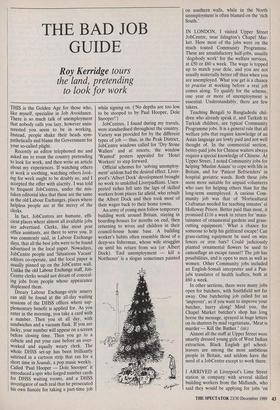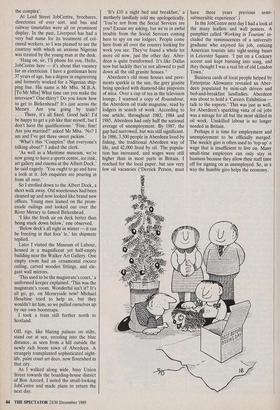THE BAD JOB GUIDE
Roy Kerridge tours
the land, pretending to look for work
THIS is the Golden Age for those who, like myself, specialise in Job Avoidance. There is so much talk of unemployment that nobody calls you lazy, however unin- terested you seem to be in working. Instead, people shake their heads sym- pathetically and blame the Government for your so-called plight.
Recently an editor telephoned me and asked me to roam the country pretending to look for work, and then write an article about my experiences. If watching others at work is soothing, watching others look- ing for work ought to be doubly so, and I accepted the offer with alacrity. I was told to frequent JobCentres, under the mis- taken editorial idea that these are the same as the old Labour Exchanges, places where helpless people are at the mercy of the clerks.
In fact, JobCentres are humane, effi- cient places where almost all available jobs are advertised. Clerks, like most post office assistants, are there to serve you. It was commonly said, in Labour Exchange days, that all the best jobs were to be found advertised in the local paper. Nowadays, JobCentre people and 'Situations Vacant' editors co-operate, and the local paper is usually pinned up on the JobCentre wall. Unlike the old Labour Exchange staff, Job- Centre clerks would not dream of conceal- ing jobs from people whose appearance displeased them. Dreary Labour Exchange-style misery can still be found at the all-day waiting sessions of the DHSS offices where sup- plementary benefit is applied for. As you enter in the morning, you take a card with a number. Then you sit all day, with sandwiches and a vacuum flask. If you are lucky, your number will appear on a screen before closing time. Then you go to a cubicle and put your case before an over- worked and equally weary clerk. The whole DHSS set-up has been brilliantly satirised in a cartoon strip that ran for a short time in Sounds, a pop music weekly. Called 'Paul Hooper — Dole Snooper' it introduced a spiv who forged number cards for DHSS waiting rooms, and a DHSS investigator of such zeal that he prosecuted his own fiancee for taking a part-time job while signing on. (No depths are too low to be stooped to by Paul Hooper, Dole Snooper!') JobCentres, I found during my travels, were standardised throughout the country. Variety was provided for by the different types of job — thus, in the Peak District, JobCentre windows called for `Dry Stone Wallers' and at resorts, the window `Wanted' posters appealed for 'Hotel Workers' to step forward. Official schemes for 'solving unemploy- ment' seldom had the desired effect. Liver- pool's 'Albert Dock' development brought no work to unskilled Liverpudlians. Unex- pected riches fell into the laps of skilled workers from places far afield, who rebuilt the Albert Dock and then took most of their wages back to their home towns. An army of young men follow temporary building work around Britain, staying in boarding-houses for months on end, then returning to wives and children in their council-house home base. A building worker's habits often resemble those of a deep-sea fisherman, whose wife struggles on until his return from sea (or Albert Dock). 'End unemployment — kill a Northener' is a slogan sometimes painted on southern walls, while in the North unemployment is often blamed on the 'rich South.'
IN LONDON, I visited Upper Street JobCentre, near Islington's Chapel Mar- ket. Here most of the jobs were on the much touted Community Programme. These are unsatisfactory half-jobs, usually `dogsbody work' for the welfare services, at £50 or £60 a week. The wage is topped up to match your dole, and you are not usually materially better off than when you are unemployed. What you get is a chance to practise at working before a real job comes along. To qualify for the scheme, one year or more of unemployment is essential. Understandably, there are few takers.
Teaching Bengali , to Bangladeshi chil- dren who already speak it, and Turkish to Turkish children, are typical Community Programme jobs. It is a general rule that all welfare jobs that require knowledge of an Asian language are lowly paid and not well thought of. In the commercial section, better-paid jobs for Chinese waiters always require a special knowledge of Chinese. At Upper Street, I noted Community jobs for helping 'Muslim Asians' to cope with life in Britain, and for 'Patient Befrienders' in hospital geriatric wards. Both these jobs seem more suitable for unpaid volunteers who care for helping others than for the long-term unemployed. A curious Com- munity job was that of 'Horticultural Craftsman needed for teaching inmates' at Holloway Prison. Better paid than most, it promised £116 a week in return for 'main- tainance of ornamental gardens and grass- cutting equipment.' What a chance for someone to help his girlfriend escape! Can grass-cutting equipment be used on wire fences or iron bars? Could judiciously planted ornamental flowers be used to camouflage an escape tunnel? The job has possibilities, and is open to men as well as women. Other Community jobs included an English-Somali interpreter and a Pun- jabi translator of health leaflets, both at £60 a week.
In other sections, there were many jobs open for butchers, with Smithfield not far away. One butchering job called for an `improver', so if you want to improve your butcher, hurry along! Mind you, the Chapel Market butcher's shop has long borne the message, sprayed in huge letters on its shutters by mad vegetarians, 'Meat is murder — Kill the Buther.' (sic) Almost all the staff at Upper Street were smartly dressed young girls of West Indian extraction. Black English girl school- leavers are among the most ambitious people in Britain, and seldom have the need of a JobCentre except to work there.
I ARRIVED at Liverpool's Lime Street station in company with several skilled building workers from the Midlands, who said they would be applying for jobs 'on the complex'.
At Lord Street JobCentre, brochures, directories of ever sort, and bus and railway timetables were all on prominent display. In the past, Liverpool has had a very bad name for its treatment of col- oured workers, so I was pleased to see the courtesy with which an anxious Nigerian was treated by the young man at the desk.
`Hang on, sir, I'll phone for you. Hello, JobCentre here — it's about that vacancy for an electrician. I have a gentleman here 37 years of age, has a degree in engineering and formerly worked for a Nigerian ship- ping line. His name is Mr Mba. M.B.A. [To Mr Mba] What time can you make the interview? One-thirty? Do you know how to get to Birkenhead? It's just across the Mersey. Are you going by train? . . There, it's all fixed. Good luck! I'd be happy to get a job like that myself, but I don't have the qualifications."Fine, fine! Are you married?' asked Mr Mba. 'No? I am and I've got three sweet pickins.'
`What's this "Complex" that everyone's talking about?' I asked the clerk.
`As well as a Maritime museum, we're now going to have a sports centre, ice rink, art gallery and cinema at the Albert Dock,' he said eagerly. 'You ought to go and have a look at it. Job enquiries are pouring in from all over.'
So I strolled down to the Albert Dock, a short walk away. Old warehouses had been cleaned up and now looked like brand new offices. Young men leaned on the prom- enade railings and looked out over the River Mersey to famed Birkenhead.
`I like the fresh air on deck better than being stuck down below,' one observed.
`Below deck's all right in winter — it can be freezing in that focs' le,' his shipmate replied.
Later I visited the Museum of Labour, housed in a magnificent yet half-empty building near the Walker Art Gallery. One empty room had an ornamental rococo ceiling, carved wooden 'fittings, and ele- gant wall mirrors.
`This used to be the magistrate's court,' a uniformed keeper explained. 'This was the magistrate's room. Wonderful isn't it? It's all go, go, on Merseyside now! Michael Heseltine tried to help us, but they wouldn't let him, so we pulled ourselves up by our own bootstraps.
I took a train still further north to Scotland.
OIL rigs, like blazing palaces on stilts, stand out at sea, receding into the blue distance, as seen from a hill outside the newly rich boom town of Aberdeen. A strangely transplanted sophisticated night- life, palm court art deco, now flourished in that city.
As I walked along wide, busy Union Street towards the boarding-house district of Bon Accord, I noted the small-looking JobCentre and made plans to return the next day. `It's £10 a night bed and breakfast,' a motherly landlady told me apologetically. `You're not from the Social Services are you? Excuse my asking, but we're in awful trouble from the Social Services coming here to spy on our lodgers. People come here from all over the country looking for work you see. They've found a whole lot more oil now, just the other day. Aber- deen is quite transformed. It's like Dallas now but luckily they're not allowed to pull down all the old granite houses."
Aberdeen's old stone houses and pave- ments sparkle in the sun, the grey granite being specked with diamond-like pinpoints of mica. Over a cup of tea in the television lounge, I scanned a copy of Roustabout, the Aberdeen oil trade magazine, read by lodgers in search of work. According to one article, throughout 1983, 1984 and 1985, Aberdeen had only half the national average of unemployment. By 1987, the gap had narrowed, but was still significant. In 1986, 3,500 people in Aberdeen lived by fishing, the traditional Aberdeen way of life, and 42,000 lived by oil. The popula- tion has increased, and wages were still higher than in most parts in Britain. I reached for the local paper, but saw very few oil vacancies Merrick Person, must have three years previous semi- submersible experience'.) In the JobCentre next day I had a look at the many leaflets and wall posters. A pamphlet called 'Working in Tourism' in- cluded the reminiscences of a university graduate who enjoyed his job, enticing American tourists into sight-seeing buses in Leicester Square. 'I put on a Cockney accent and kept bursting into song, and they thought I was a real bit of old London Town.'
Business cards of local people helped by Enterprise Allowance revealed an Aber- deen populated by mini-cab drivers and bed-and-breakfast landladies. Aberdeen was about to hold a 'Careers Exhibition talk to the experts.' This was just as well, for Aberdeen's sparkling vista of oil jobs was a mirage for all but the most skilled in oil work. Unskilled labour is no longer needed in Britain.
Perhaps it is time for employment and unemployment to be officially merged. The weekly giro is often used to lop-up' a wage that is insufficient to live on. Many small-time employers can only stay in business because they allow their staff time off for signing on as unemployed. So, in a way the humble giro helps the economy.











































































































 Previous page
Previous page